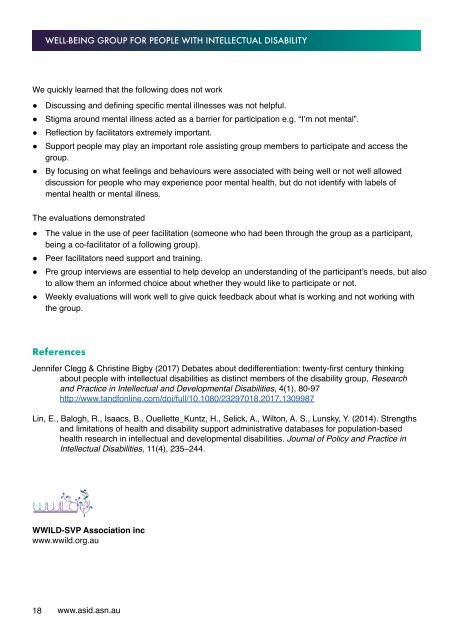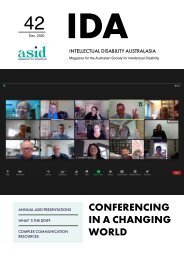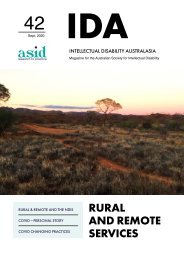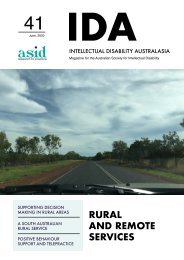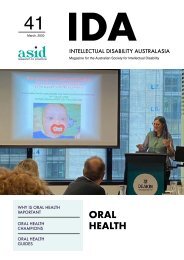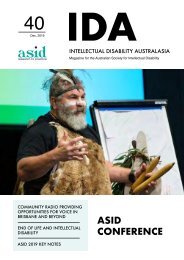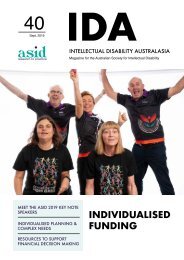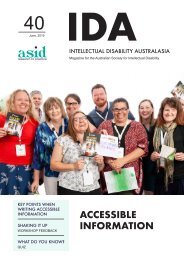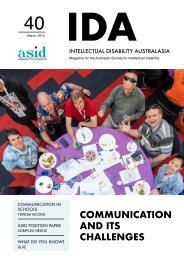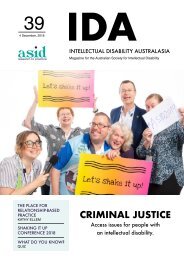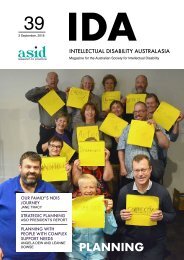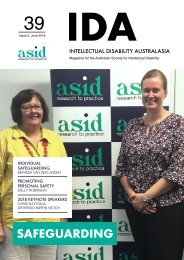IDA Magazine Vol 39 Iss 1 (Mar 2018)
You also want an ePaper? Increase the reach of your titles
YUMPU automatically turns print PDFs into web optimized ePapers that Google loves.
WELL-BEING GROUP FOR PEOPLE WITH INTELLECTUAL DISABILITY<br />
We quickly learned that the following does not work<br />
●●<br />
●●<br />
●●<br />
●●<br />
●●<br />
Discussing and defining specific mental illnesses was not helpful.<br />
Stigma around mental illness acted as a barrier for participation e.g. “I’m not mental”.<br />
Reflection by facilitators extremely important.<br />
Support people may play an important role assisting group members to participate and access the<br />
group.<br />
By focusing on what feelings and behaviours were associated with being well or not well allowed<br />
discussion for people who may experience poor mental health, but do not identify with labels of<br />
mental health or mental illness.<br />
The evaluations demonstrated<br />
●●<br />
●●<br />
●●<br />
●●<br />
The value in the use of peer facilitation (someone who had been through the group as a participant,<br />
being a co-facilitator of a following group).<br />
Peer facilitators need support and training.<br />
Pre group interviews are essential to help develop an understanding of the participant’s needs, but also<br />
to allow them an informed choice about whether they would like to participate or not.<br />
Weekly evaluations will work well to give quick feedback about what is working and not working with<br />
the group.<br />
References<br />
Jennifer Clegg & Christine Bigby (2017) Debates about dedifferentiation: twenty-first century thinking<br />
about people with intellectual disabilities as distinct members of the disability group, Research<br />
and Practice in Intellectual and Developmental Disabilities, 4(1), 80-97<br />
http://www.tandfonline.com/doi/full/10.1080/23297018.2017.1309987<br />
Lin, E., Balogh, R., Isaacs, B., Ouellette_Kuntz, H., Selick, A., Wilton, A. S., Lunsky, Y. (2014). Strengths<br />
and limitations of health and disability support administrative databases for population-based<br />
health research in intellectual and developmental disabilities. Journal of Policy and Practice in<br />
Intellectual Disabilities, 11(4), 235–244.<br />
WWILD-SVP Association inc<br />
www.wwild.org.au<br />
18 www.asid.asn.au


